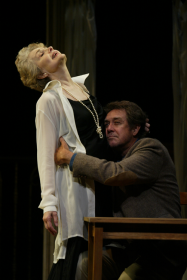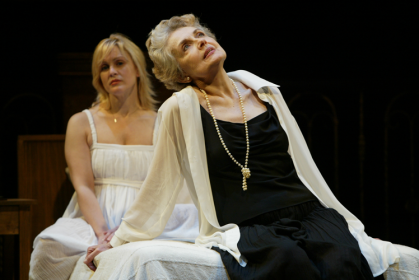- warning: Invalid argument supplied for foreach() in /var/www/vhosts/newdramatists.org/archive.newdramatists.org/sites/all/modules/ndadmin/ndadmin.module on line 237.
- warning: array_slice() expects parameter 1 to be array, null given in /var/www/vhosts/newdramatists.org/archive.newdramatists.org/sites/all/modules/ndadmin/ndadmin.module on line 240.
Madagascar
The haunting story of a mysterious disappearance that changes three lives forever. At three different periods in time, three Americans find themselves alone, in the same hotel room overlooking the Spanish Steps in Rome: June, a young woman who works as a tour guide of the city’s ancient ruins; Lilian, her wealthy and elegant jet-setting mother; and Nathan, a rumpled university economist and the best friend of Lilian’s famous deceased husband. They each tell their individual story of how and why they are here. Their relationship to each other, what this room means to them, and why they have been called to it slowly reveal themselves. Their stories spill out, weave back and forth—each contradicting, clarifying, deepening what the others say—becoming strands of one gripping and disquieting tale.


Read Sample
PROLOGUE
In the darkness we hear a movement from Bach’s “Six Suites for Unaccompanied Cello.” In the slowly rising light we begin to make out the projected image of a fragment of the Eleusinian Relief: two women and a boy between them, all carved in marble. The movement ends as the image comes sharply into focus.
A shaft of light reveals JUNE, center stage. She is in her early 30s, barefoot, dressed in a simple white linen nightgown. Surrounded by darkness, she speaks directly to us.
JUNE
People disappear all the time. I don’t mean children who are taken or stolen and then, so often...well, we all know enough about that. I mean people, the over eighteen kind. Thousands and thousands, every year. Almost all of them end up being found. Very few are murdered. Comfortingly few. Statistically, less than two percent are victims of “foul play.” Which always makes me think of exuberant chickens running around.
(Beat.) Or maybe that’s just me.
Those who aren’t found, nine times out of ten it’s because they chose to go missing. (beat) I didn’t know this. That so many people choose to step away from their lives. They owe money, someone’s pregnant, they’ve done a terrible thing, or they’ve just had enough. Life rises and rises, until all you can do is drown or swim away. And if you haven’t broken any laws, this is perfectly legal. Even if you were tracked down, say, paddling the Congo or wandering alone in the Sahara, no one can force you to go back. If you choose to vanish, you owe your past nothing.
But what interests me most are those left behind. The ones forced to go on, never knowing if they said or did something that led to the vanishing. If they are honest, they will tell you that even when all evidence points to a planned disappearance…they will themselves to reject this, and cling to any alterative they can find…even death.
They will tell you that if someone is going to choose to disappear, they need to stay gone. That what is feared most is a return. Because some do. The tiniest percentage, but they do. Even after years, they just…reappear. As vengefully as they disappeared.
Some things cannot be faced.
(A stream of light reveals LILIAN, sitting stage right. She is around 60, elegantly dressed in pants and a sweater. She sits in a chair, legs crossed. There are pearls at her throat. She smiles as she speaks to us.)
LILIAN
When I fly, wherever I fly, I am always asked, even at my age: “And what do you do?” Every flight, every time. New York to Geneva, Geneva to Rome—
“And what do you do?”
I understand this is self-protection. We live in dangerous times. Buckling in, people are desperate for conversation. Anything that will divert them from the slim but real possibility that our time together will end in a screaming, fiery death. And who wants to sip a wine spritzer and talk about that. But I have always found the question deeply unnerving. Every time I am asked—still—my mouth goes dry and my mind goes blank. If I were honest, I would simply lean in and say:
(She does so, speaking intimately to her seatmate…) “I stay in motion.”
But who wouldn’t prefer a screaming, fiery death over talking to someone like that.
I am not trying to be coy. I know this is not the most thunderously impressive achievement to hang a life on. But it is what defines me. We are who we are: there is no escape from that. And, of course, I regret this lack of achievement. I find, more and more, I regret a great deal. There are days when I swim in an ocean of regret. Not that I burden others with this. Certainly not my children. After all, there is nothing more tedious than your own parents’ disappointment. And now I have no idea where I was going with all this—totally lost; full stop; another wine spritzer, please.
(A realization; she smiles.)
But this has now become a perfect example of why one stays in motion. Because what I have learned in life is that no matter what happens, no matter how lost you are, you must always keep going forward. This is the first of my three golden rules. For if one simply talks and talks, things, often for the first time, become clear. When one is faced with the unfathomable, all one can do is speak through it. This is the only hope you have of untangling a mystery.
(We hear footsteps, as NATHAN, walks out of the darkness and toward us from stage left. He is around 60, in slacks and a sports coat. His clothes are rumpled, his face unshaven, and his eyes bleary. He stops at mid-stage and speaks to us.)
NATHAN
I enter the room, I see five men. This is the only part I ever remember. The walls are white. Naked lightbulb. A man sits in a chair in front of a table. He’s dressed in black, head to toe, with a thick mane of black hair. Three heavies, they’re holding his hands down, pinning him so he can’t get up. The last fellow stands to the side, asking questions. Question after question. And the man in the chair won’t answer, so they start cutting his fingers off with a saw. The palms are held down, and the saw cuts into the bone—
(He holds up his hands, the backs of them facing us.)
Here, right above the knuckles. The blood gushes everywhere, across the table, onto the floor. The man in black is screaming; both hands are cut halfway through. A few more sawings and his fingers will be totally severed. But I force myself not to look away. Grit my teeth so I don’t vomit. Because my job is to collect information. I have to watch this. That’s why I’m here. The man is screaming, like a wounded animal, snot runs out of his nose, eyes roll back in his head…I’m the man. The one being maimed. The shock of this realization is what wakes me. And what I’m left with, every time, is guilt. A vice on my chest, squeezing me. Because I’m a traitor, I’ve torn everything down.
Now I have to be punished.
ACT ONE
A shift of light. Music.
For a moment, the three of them are in tableau: their bodies frozen against the image of the two women and the boy, carved in stone.
A shift of light again, brighter now, as the image changes. Behind them, we see a projection of the Spanish Steps in the Piazza di Spagna, Rome.
On the stage we see a once grand hotel room now stripped of its finery: a simple bed and nightstand, a chair and table, a window frame. Where a chandelier used to hang, there is only a dangling lightbulb. Throughout, everyone is on stage—in this room, but at their own specific point in time.
NATHAN and LILIAN begin to walk toward the lip of the stage as JUNE speaks to us.
Behind her, we see briefly the faint outline of the words: A FEW DAYS AGO.
JUNE
Most of the groups I show around Rome are American. I only do small groups, a dozen people at most. Bigger than that, you have to use microphones and wear name tags. Spending my days wearing a sticker over my breast that says “June” is…well, when I moved here from New York three years ago, it was to get away from things like that. The anonymity of this work is what makes it so appealing. I don’t know you, you don’t know me: we can be anyone we want.
NATHAN and LILIAN have reached the edge of the stage. Throughout, all three actors play the secondary characters that appear. Throughout, as they move to and fro about the room—sitting in a chair, looking out the window, crossing to the veranda; even when physically touching and looking at each other—everything is addressed to us.
FEMALE TOURIST
(Brightly) We’re from Boulder!
Cast Requirements
1 man
2 women
Set Description
Flexible Set
Honors
Winner: Pinter Review Prize, the American Theatre Critics Association’s Osborne Award, and picked as Best Play of the Year by the Miami Herald and the Miami New Times.
Production and Development History
World Premiere: Salt Lake Acting Company (2004). Subsequent productions: Summer Play Festival (2005); the Adirondack Theatre Festival (2005); New Theatre, Miami (2005); and Northcoast Rep (2008); Melbourne Theatre Company (2010); Black Swan State Theatre Company, Perth (2010); Theatre 503, London (2010).


